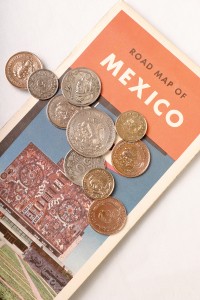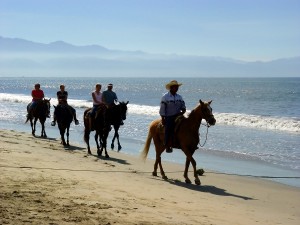Mexico Real Estate – Protect your investment, work with a professional.

I am often asked “Can foreigners really buy Mexico Real Estate?” The answer is a resounding yes – but only if you use the same common sense you would use in Canada or the U.S., use a qualified real estate professional and have competent legal representation. Follow this formula and you and your family will have a safe investment that you can enjoy and benefit from for many, many years.
Although there is no possible way to explain the intricacies of real estate with this mini Mexico real estate guide format, I will try to give a reasonable understanding of the process – and give you some tips on protecting your investment and interests. I strongly recommend seeking professional guidance. More often than not, it costs you nothing but it can save you headaches, time, money…or even your entire investment!
It doesn’t surprise me that people visit this wonderful country called Mexico and fall in love with her charm and beauty. It doesn’t surprise me when folks say that they can’t believe how friendly the people are or how affordable everything is. I’m not even surprised when someone says they want to live here part-time, or even permanently. I am amazed, however, when they decide to invest in real estate and work with the first person they meet that says they “sell” real estate.

There are literally millions of folks in Mexico that will say they sell real estate. Very few of them do this as their fulltime job and even fewer are trained in the BASICS! Would you allow a taxi driver to give you a root canal? How about getting brain surgery from a waiter? Of course you wouldn’t! You don’t risk what is important to you with someone that doesn’t have the knowledge to help you…period!
There is plenty of misinformation when it comes to owning property in Mexico. It is also the case that a little information can be dangerous (do you have a know-it-all in-law). Please use this Mexico real estate guide as a basic primer for general information purposes only and seek professional representation to buy real estate in Mexico. If you are considering a pre-construction project, I stress this point even more – there are very few legal protections with this type of investment…no matter what the nice salesman tells you!
How Foreigners Own Mexico Real Estate
The Mexican constitution states that foreigners may not directly own land in the “restricted zone”. Although this sounds scary, the restricted zone is simply all the land up to 100 km (about 60 miles) from the borders, all the land up to 50 km (around 30 miles) from the Mexican coastline, and the entire Baja. All other Mexican lands may be owned outright (fee simple) by foreigners. To save the problem of having to change the constitution (a bad proposition for any politician), but still allow secure foreign investment, the Mexican government introduced a land trust system called a fideicomiso (pronounced “fee-day-ee-co-me-so”)

The fideicomiso is created through a Mexican financial institution (bank) and this bank holds the deed to the property…in trust. You and/or other persons that you specify are sole beneficiaries to the trust (and therefore the property). You have full rights to do whatever you like with your property: it can be developed (within the law), rented, leased, sold, or given away. In other words, fee simple ownership in all but name. The great news is that the property is not an asset of the bank. If the bank fails…the trust is transferred to another financial institution.
THE PROCESS
Find Your Agent – A good rule of thumb is to make sure your agent has at least 1-2 years experience practicing real estate in Mexico, a minimum of 10 completed transactions, CONOCER certification (a standards based competency certification given by the Mexican government), and belong to Mexico real estate’s professional association, A.M.P.I. – ASK FOR THE PROOF!
You do not need a license to sell in Mexico real estate. If that last sentence doesn’t concern you, read it again.
Financing – If you need it…get it now! Nothing is worse than finding the perfect Mexican property and losing it to someone else because the other person had their ducks in a row before you. Most sellers in Mexico will not accept “subject to financing” in the agreement. Your agent should be able to connect you to some lenders. An ethical agent will also disclose if he will receive a commission for this service. Ask the question so you know who your agent is really working for.
Find the Property – If you are in a market that has an MLS, use it. Your agent should have asked you a million questions by now to make sure that the properties they will show you will actually meet your criteria. If you feel that the agent is not listening to you…find a new one – quick! Don’t be surprised if you ask for a 3 bedroom condominium, with a pool, and close to the beach and they come back with a 1 bedroom house on a mountain with no running water (ok, that may be an extreme example but it’s pretty darn close).
The Sales Agreement – You found the place of your dreams…now, to avoid the nightmares – The agent will put together the sales agreement and, if he/she is a true professional, have it checked by a licensed Mexico real estate attorney. Your agent’s fiduciary (first) responsibility is to protect you and your rights (whether your agent knows that will depend on how well you interviewed him/her). One other thing to consider – make sure you are working with an agent that knows the property’s true market value and can negotiate. Just because something seems like a good value doesn’t mean that is what it is worth. It’s only money…but it’s your money, right?

After the Sales Agreement Is Accepted – Your agent should give you an estimate of closing expenses – based upon the actual accepted purchase price. Closing expenses can be anywhere from 4 – 10 percent of the purchase price (more if financing is involved). Some expenses are fixed and some are percentages of the purchase price. The fixed expenses can be the same whether the property is 150K USD or 950K USD and that is the reason for the spread. Generally, the more expensive the property, the lower the percentage of the sale price the closing expenses will be. These costs will cover setting up the trust, the first year’s trust fee, permits, the property acquisition tax, legal expenses, and more. None of this is paid to the agent or the seller, only the Notario’s office (more on him later) and the government.
The lawyer or the Notario (they can be different individuals) will ask for a deposit to start the closing process. The amount is usually 25%-50% of the estimated closing amounts and is completely legitimate. There will be expenses to start the closing process. You will also be asked for copies of your identification (passport, driver’s license, and proof of residence – current phone or electric bill). A quick side note – if the seller or agent asks you to declare a lower amount for the property than was agreed to…run away! No really…run away!.
Set Up An Escrow Account – Your agent should ALWAYS recommend you set up an escrow account for the purchase. It is around $850 USD but it is the safest way to buy Mexico real estate and probably the best money you will ever spend. The agent will set up this account for you. Americans are very familiar with the escrow concept but it is mostly unknown to Canadians. In a nutshell, the initial deposit and remaining purchase amount are deposited into a U.S. escrow account. The money is only disbursed when the buyer, seller and Notario agree that all conditions have been met and there is a legal sale at the closing. If a seller or agent (yours or their’s) asks you to give them any of the purchase amount to hold in trust in their “trust account”…run away! When I first wrote this Mexico real estate guide, there were no options to set up an escrow account with a Mexican bank. Happily, this is changing.
Title Insurance – Depending on the circumstances of the sale or property, title insurance may be a good idea. Title insurance rates are in the $5-$6USD / $1,000 of the property’s value. Talk to your agent about the value of title insurance. I will be giving more instruction on this in an upcoming webinar.
Until the closing, there is not much else to do. The Notario or attorney will ask you to complete a beneficiary statement called a KYC (know your client). This is how ownership will be defined on the trust. There are “primary” beneficiary(s) (generally the buyer and/or a spouse or partner) and “substitute” beneficiaries (generally, the heirs). The substitute beneficiaries have no validity to the ownership unless the “primary” beneficiary(s) dies.

The great thing about the trust is that upon death of the primary beneficiary(s), ownership is immediately transferred to the substitute beneficiary(s) with no estate taxes or probate. There will, however, entail a process to finalize this and it will involve certification of the death certificate by a Mexican government representative and some work by the Notario – with some fees due. This is one of those things best handled by an attorney.
Back to the closing – You will also have to decide if you are going to be in Mexico for the closing because, if not, a power of attorney may be needed so someone can sign on your behalf. Closings generally take 30-90 days on a cash sale and 90-180 on financing. The fastest I have seen a closing go (with a foreigner) is about 28 days.
At the Closing –All parties are represented. You will again be asked for some identification. Bring your passport and, if you are in Mexico for the closing, your visa that legally allows you to be in Mexico. The Buyer and Seller verify that all information is correct and sign where they must. The Notario signs off and the property is transferred to the buyer once the Notario verifies that the funds have been wired to the Seller (usually from escrow).
Congratulations, you now have the pleasure of owning a Mexican home. Have a margarita and count your lucky stars that you worked with a competent Mexico real estate professional.

AFTER THE SALE – What now?
For you folks that want to know as much as possible, I would like to add this little prologue. There are some things you will be responsible for after the sale.
Bank Trust Fees – Paid yearly and run $400-$650 USD/year depending on the bank. For the most part, there is no differentiation between institutions, other than the price. Your first year is covered in the closing fees. What do you get for this…not much? I have heard rumors that the Mexican congress is considering doing away with the trusts for foreigners. I have my doubts because that will take a change to the Mexican constitution – not a likely scenario.
Property Taxes – They are almost free in Mexico but still worth mentioning. Currently, they are around $100 for every $100,000 of the appraised value. This will undoubtedly change someday but it should all be reasonable (to foreigners anyway). If they are raised too much, an angry electorate would pass judgment on the offending politicians.
Property Insurance – Most folks do not have it here (concrete doesn’t catch fire easily) but it is worth exploring. There are many reputable insurance companies in Mexico.

Name Change on Utilities – A few days after the closing, the Notario will issue a letter stating that you own the property. With this letter, it is possible to change the names on the utilities (water and electricity). If there was a phone line included in the sale of the property, you will need a letter from the seller to change the service to your name. An extra note about the water contract. Recently, there have been more than a few instances of the original escritura not referencing the house number of the home being sold. There will be a lot number in the description but nothing tying the two together. This is a HUGE pain to resolve after the closing and is best to resolve before. Your agent may not even be aware of this (especially if they have a few sales under their belt) so ask.

Utilities – You have to pay them in Mexico too – the good news is you won’t freeze to death if the power is cut off in the winter. Most utilities are equal to or less than U.S. and Canada rates. If you can keep your utilities below a certain threshold, the Mexico government will even subsidize your bill! CFE is Mexico’s national electricity company.
A Little More About the Notario – The Notario is the ONLY entity in Mexico that can transfer title regarding Mexico real estate. The Public Notario is not like a public notary in the U.S. and Canada. To qualify as a Notario, the person must have a Mexican law degree, be at least 35 years old, and have at least 3 years experience working in a public notary office, pass a stringent exam, and be appointed – for life – by the state governor. The Notario’s fiduciary responsibility is to the federal government (one of the little secrets you need to understand and the main reason you need professional representation for a Mexico real estate transaction). He will verify that a contract is legal but is under no obligation to counsel on the wisdom or terms of the contract.
Fill out the area below to leave a comment or ask a question. If you’d prefer, you can email me directly at john(@)mexicolife.com. To see properties right now, visit Mexico Life Realty for our local MLS services (in the Puerto Vallarta and Riviera Nayarit area)!
This is good information. I have shared it with my brother who is my partner in business. He will be helping me along the way. I am happy To meet you and look forward to talking with you.
Thank you for the information. It is very informative. We are looking forward to working with you guys on the purchase of our second home.
Roxanne Armstrong and Donald Haerling